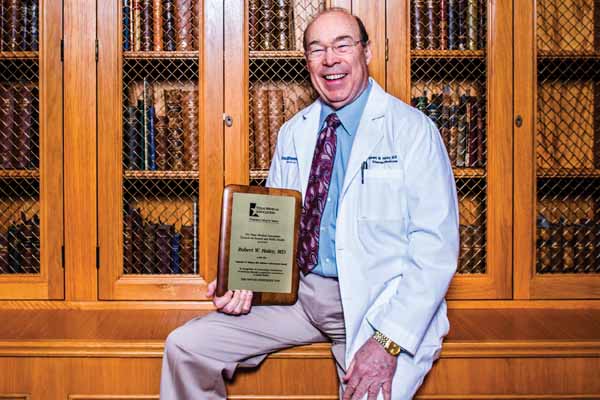
In 2012, Dallas faced an unprecedented outbreak of West Nile virus.
“ERs were packed, and then the ICUs,” said Robert Haley, MD, director of the division of epidemiology at UT Southwestern Medical Center, who helped coordinate the region’s response. “We ran out of ventilators at some of the hospitals.”
Aerial pesticide spraying finally helped control the mosquitos that spread West Nile virus, but not before the epidemic sickened 173 and killed 21. In the aftermath, Dr. Haley worked with Dallas County health officials to figure out how to prevent future outbreaks.
His work on West Nile virus – along with numerous other achievements – earned Dr. Haley the inaugural Dr. Laurance N. Nickey Lifetime Achievement Award. Presented by the Texas Medical Association’s Council on Science and Public Health, the award recognizes a TMA member physician who has made outstanding contributions to medicine through a significant commitment to public health. Dr. Haley was honored also for pioneering achievements in combatting Gulf War syndrome, hospital infections, and public health threats caused by air pollution, among others.
He says his collaborative work with other researchers has become the accepted way to combat West Nile virus by the U.S. Centers for Disease Control and Prevention (CDC). For example, they found that specific weather patterns – a warm winter without hard freezes followed by a warm, wet spring – always predicted an outbreak. Also, more aggressive use of mosquito trap data could warn health departments when the infected mosquito population was large enough to spread the disease.
“We should never have another West Nile epidemic,” he said.
Dr. Haley grew up in Dallas, graduated from UT Southwestern Medical School in 1971 and completed his internal medicine residency at Dallas’ Parkland Memorial Hospital.
Not surprisingly, much of his career and work have focused on his hometown. For instance, he was instrumental in calling attention to the health problems caused by the pollution from three coal-fired power plants near Dallas. Two of the plants are now closed. That project and his work with West Nile virus also lead him to speak out frequently – including at this year’s TMA’s Winter Conference – about the health threats posed by climate change.
Dr. Haley spent much of the 1970s working for CDC in Atlanta, first as an epidemic investigator and later as a research epidemiologist and public health official. One of his first tasks required investigating disease outbreaks in hospitals. At the time, this was a neglected area of medicine, but his national study eventually helped cut hospital infections by one-third.
Among other things he showed when infections caused by medical workers are most likely to occur. For instance, infections typically peak in a newborn nursery when understaffing and overcrowding reduce the nurse-to-infant ratio, and nurses have less time to wash their hands, he says. Hospitals can cut infections simply by maintaining the correct ratio.
“I learned at CDC that these things tend to go on and on and on, and people say that’s how it’s always been,” Dr. Haley said. “But when you measure it, [physicians and nurses] become concerned and they will fix it.”
He is perhaps proudest of his work in identifying the cause of Gulf War syndrome. Shortly after the 1991 Gulf War in Iraq, about 150,000 of the 700,000 people deployed began complaining of a vague set of symptoms that resembled influenza.
The military and the Veterans Administration studied the mystery ailment but could not find any one cause. Over time, they blamed the collection of symptoms on post-traumatic stress disorder or declared the cause unknown.
In 1994, Dallas billionaire H. Ross Perot approached Dr. Haley to help investigate the cause of the illness. That led Dr. Haley and collaborators at seven universities to a 25-year search.
A study of a single battalion led to the discovery of the biggest risk factor for Gulf War syndrome: nerve gas exposure. Dr. Haley recently replicated these findings in a large representative sample of Gulf War veterans. Being able to diagnose the illness has helped improve treatment options.
Despite his long career and many achievements, Dr. Haley, 74, says he has no plans to retire.
“A career is coming to work every day, and you try to do things that are noteworthy,” he said. “You just keep working on things and get as much good stuff done as you can.”
Tex Med. 2020;116(3):26-27
March 2020 Texas Medicine Contents
Texas Medicine Main Page